|
Books Should Be Free Loyal Books Free Public Domain Audiobooks & eBook Downloads |
|
|
Books Should Be Free Loyal Books Free Public Domain Audiobooks & eBook Downloads |
|
Religion |
|---|
|
Book type:
Sort by:
View by:
|
By: Friedrich Bente [translator] (d. 1930) | |
|---|---|
 Book of Concord Preface
Book of Concord Preface
The Christian Book of Concord was published in 1580 as a collection of eleven documents: Three Ecumenical Creeds and eight documents from the Reformation Era. Here is the Preface to the entire work together with the Saxon Visitation Articles from 1592. | |
By: Friedrich Nietzsche (1844-1900) | |
|---|---|
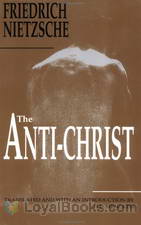 The Antichrist
The Antichrist
Save for his raucous, rhapsodical autobiography, Ecce Homo, The Antichrist is the last thing that Nietzsche ever wrote, and so it may be accepted as a statement of some of his most salient ideas in their final form. Of all Nietzsche’s books, The Antichrist comes nearest to conventionality in form. It presents a connected argument with very few interludes, and has a beginning, a middle and an end. | |
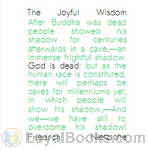 The Joyful Wisdom
The Joyful Wisdom
The Joyful Wisdom (later translated as The Gay Science), written in 1882, just before Zarathustra, is rightly judged to be one of Nietzsche’s best books. Here the essentially grave and masculine face of the poet-philosopher is seen to light up and suddenly break into a delightful smile. The warmth and kindness that beam from his features will astonish those hasty psychologists who have never divined that behind the destroyer is the creator, and behind the blasphemer the lover of life. In the retrospective... | |
By: Friedrich von Hügel (1852-1925) | |
|---|---|
 Essays and Addresses on the Philosophy of Religion
Essays and Addresses on the Philosophy of Religion
Baron Friedrich von Hugel was a lay Catholic theologian whose work was influential during the rise of modernist thought. His Essays and Addresses on the Philosophy of Religion became a favorite work of later Christian writers C.S. Lewis and Flannery O'Connor. The book compiled previously written material into a single collection, divided into three parts: the first, on religion and theism in general; the second, on Christ's teachings and Christianity in general; the third, on the Catholic Church. - Summary by Dylan P. Straub | |
By: Fulke Greville (1554-1628) | |
|---|---|
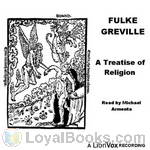 A Treatise of Religion
A Treatise of Religion
Part diatribe, part discourse, part sermon and part stand-up comedy, this is Fulke Greville's 114 stanza, verse-poem about religious hypocrisy. | |
By: G. A. McLaughlin (1851-1933) | |
|---|---|
 Saved and Kept: or How to Get Saved and How to Keep Saved
Saved and Kept: or How to Get Saved and How to Keep Saved
This little volume is by no means intended to be a theological work. Nor does it attempt to show the details of the Christian life. The author seeks to point out the principal means by which sincere souls may be saved and keep saved. It is intended to be a simple, direct exposition of the way of salvation, put in every-day language, with the earnest desire that ‘‘he that runneth may read,"’ and that the reader may be helped in reaching the goal, and in finding an abundant entrance into the City of God. With this single aim we launch this little book, praying that it may be helpful to some soul who seeks to know what God has for him. - Summary by G. A. McLaughlin | |
 Clean Heart
Clean Heart
"Much of the preaching and teaching of religion is in a theological dialect that is scarcely more intelligible to the people than a foreign language. Many pulpits need an interpreter as much as do the foreign missionaries among the heathen. The attempt of the writer is to put the matter of full salvation in a simple, direct way, that all may see the simplicity of a subject that is sometimes “darkened with words". It is an attempt to show that the experience of a clean heart is but the answer to a prayer that is both scriptural and reasonable. It is an attempt to furnish food for hungry souls...” | |
By: G. Campbell Morgan (1863-1945) | |
|---|---|
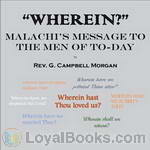 Wherein?
Wherein?
These studies in the book of Malachi were delivered as addresses to the students at Mr. Moody’s Bible School in Chicago, and then to my own congregation. They have also appeared in “The Record of Christian Work” in the United States, and in “Out and Out” in England. They are now sent out in a more permanent form, after careful revision, with the prayer that they may be used of God in calling His own children into the place of power without which form is nothing. (Introduction by G. Campbell Morgan) | |
 First Century Message to Twentieth Century Christians
First Century Message to Twentieth Century Christians
G. Campbell Morgan was one of the leading evangelical preachers of his day. He began preaching at age 13 and by age 26 was teaching at the Moody Bible Institute in Chicago, Illinois. He returned to England in 1904 to become pastor at Westminster Chapel in London. He was a contemporary and friend Martyn Lloyd-Jones, F. B. Meyer and Charles Spurgeon. In this book, Morgan examines the letters to the seven churches of Asia which begin the book of Revelation in the New Testament. Over 1900 years have passed, and yet our churches today face many of the same temptations, struggles and challenges as those faced by these first century believers... | |
 Practice of Prayer
Practice of Prayer
God has made prayer possible to us through Jesus. We can pray prevailingly only as we respond to the truths which create the possibility. The sphere of prayer includes the coming of the Kingdom of God and the provision of all the need of the saints. Thus all these constitute an integral part of the subject of the practice of prayer. Prayer is only possible to the revealed Father through the mediating Son by the inspiring Spirit. Prayer is only a prevailing power as, in the life, the child of God is loyal to His Kingship, satisfied with His provision, conformed to His likeness. Moreover, it can only be operative within the sphere revealed in the pattern of prayer. | |
By: G. H. (George Henry) Gerberding (1847-1927) | |
|---|---|
 The Way of Salvation in the Lutheran Church
The Way of Salvation in the Lutheran Church
| |
By: G. K. Chesterton (1874-1936) | |
|---|---|
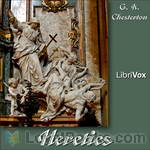 Heretics
Heretics
The Author Gilbert Keith Chesterton was born in London, England on the 29th of May, 1874. Though he considered himself a mere “rollicking journalist,” he was actually a prolific and gifted writer in virtually every area of literature. A man of strong opinions and enormously talented at defending them, his exuberant personality nevertheless allowed him to maintain warm friendships with people–such as George Bernard Shaw and H. G. Wells–with whom he vehemently disagreed. Chesterton had no difficulty standing up for what he believed... | |
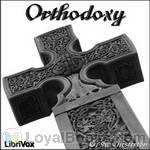 Orthodoxy
Orthodoxy
Orthodoxy is a book that has become a classic of Christian apologetics. In the book's preface Chesterton states the purpose is to "attempt an explanation, not of whether the Christian faith can be believed, but of how he personally has come to believe it." In it, Chesterton presents an original view of the Christian religion. He sees it as the answer to natural human needs, the "answer to a riddle" in his own words, and not simply as an arbitrary truth received from somewhere outside the boundaries of human experience. | |
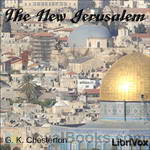 The New Jerusalem
The New Jerusalem
“On the road to Cairo one may see twenty groups exactly like that of the Holy Family in the pictures of the Flight into Egypt; with only one difference. The man is riding on the ass.” “The real mistake of the Muslims is something much more modern in its application than any particular passing persecution of Christians as such. It lay in the very fact that they did think they had a simpler and saner sort of Christianity, as do many modern Christians. They thought it could be made universal merely by being made uninteresting... | |
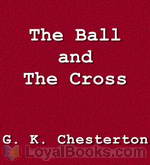 The Ball and the Cross
The Ball and the Cross
The Ball and the Cross is G. K. Chesterton's third novel. In the introduction Martin Gardner notes that it is a "mixture of fantasy, farce and theology." Gardner continues: "Evan MacIan is a tall, dark-haired, blue-eyed Scottish Highlander and a devout Roman Catholic.... James Turnbull is a short, red-haired, gray-eyed Scottish Lowlander and a devout but naive atheist.... The two meet when MacIan smashes the window of the street office where Turnbull publishes an atheist journal. This act of rage occurs when MacIan sees posted on the shop's window a sheet that blasphemes the Virgin Mary, presumably implying she was an adulteress who gave birth to an illegitimate Jesus... | |
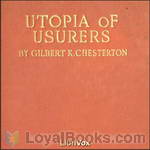 A Utopia of Usurers
A Utopia of Usurers
“Now I have said again and again (and I shall continue to say again and again on all the most inappropriate occasions) that we must hit Capitalism, and hit it hard, for the plain and definite reason that it is growing stronger. Most of the excuses which serve the capitalists as masks are, of course, the excuses of hypocrites. They lie when they claim philanthropy; they no more feel any particular love of men than Albu felt an affection for Chinamen. They lie when they say they have reached their position through their own organising ability... | |
 Everlasting Man
Everlasting Man
This book needs a preliminary note that its scope be not misunderstood. The view suggested is historical rather than theological, and does not deal directly with a religious change which has been the chief event of my own life; and about which I am already writing a more purely controversial volume. It is impossible, I hope, for any Catholic to write any book on any subject, above all this subject, without showing that he is a Catholic; but this study is not specially concerned with the differences between a Catholic and a Protestant... | |
 Catholic Church and Conversion
Catholic Church and Conversion
Written after his conversion, G.K. Chesterton explains his understanding of Catholicism, and discusses the nature and the process of conversion to the Catholic faith. | |
By: G. MacLaren (George MacLaren) Brydon (1875-1963) | |
|---|---|
 Religious Life of Virginia in the Seventeenth Century The Faith of Our Fathers
Religious Life of Virginia in the Seventeenth Century The Faith of Our Fathers
| |
By: Gaius Glenn Atkins (1868-1956) | |
|---|---|
 Modern Religious Cults and Movements
Modern Religious Cults and Movements
| |
By: Gautama Buddha (563-483 BC) | |
|---|---|
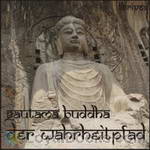 Der Wahrheitpfad (Dhammapadam)
Der Wahrheitpfad (Dhammapadam)
Das Dhammapada ist eine Anthologie von Aussprüchen des Buddha. Dabei sind die Verse so ausgewählt, dass sie den Kern der Lehre des Buddha wiedergeben. Es ist einer der bekanntesten Texte dieser Lehre und findet seine weiteste Verbreitung im südlichen Buddhismus. Dort begleitet es die Schüler des Buddha vom Anfang bis zum Ende ihres Pfades. Darüber hinaus ist es ein Meisterwerk sowohl der frühen buddhistischen Literatur als auch der indischen Tradition des Karvya (Belle Lettre). | |
By: George A. (George Augustus) Cobbold (1857-) | |
|---|---|
 Religion in Japan
Religion in Japan
| |
By: George Adam Smith (1856-1942) | |
|---|---|
 Jeremiah : Being The Baird Lecture for 1922
Jeremiah : Being The Baird Lecture for 1922
| |
By: George Alfred Henty (1832-1902) | |
|---|---|
 A Jacobite Exile Being the Adventures of a Young Englishman in the Service of Charles the Twelfth of Sweden
A Jacobite Exile Being the Adventures of a Young Englishman in the Service of Charles the Twelfth of Sweden
| |
By: George Barton (1866-1940) | |
|---|---|
 Angels of the Battlefield
Angels of the Battlefield
"Angels of the Battlefield: A History of the Labors of the Catholic Sisterhoods in the Late Civil War" chronicles the compassionate services of these dedicated women during the bitter and bloody U.S. Civil War. These accounts also offer some important historical details, giving some important insights into the people and events of the war. This is the Second Edition, Revised and Enlarged. - Summary by Larry Wilson | |
By: George Berkeley (1685-1783) | |
|---|---|
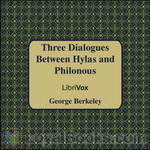 Three Dialogues Between Hylas and Philonous
Three Dialogues Between Hylas and Philonous
Berkeley uses Hylas as his primary contemporary philosophical adversary, John Locke. A Hylas is featured in Greek mythology and the name Hylas is derived from an ancient Greek word for “matter” which Hylas argues for in the dialogues. Philonous translates as “lover of mind.” In The First Dialogue, Hylas expresses his disdain for skepticism, adding that he has heard Philonous to have “maintained the most extravagant opinion… namely, that there is no such thing as material substance in the world.” Philonous argues that it is actually Hylas who is the skeptic and that he can prove it. Thus, a philosophical battle of wit begins. | |
By: George Douglas Watson (1845-1924) | |
|---|---|
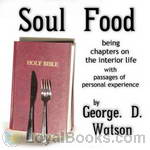 Soul Food
Soul Food
A guide for Christians to walk a godly life. Covering various practical and spiritual topics. | |
By: George F. Dillon (1836-1893) | |
|---|---|
 War of Antichrist with the Church and Christian Civilization
War of Antichrist with the Church and Christian Civilization
The War of Anti-Christ with the Church and Christian Civilization is a book written in 1885 by an Irishman, George F. Dillon, DD. It was republished by Fr. Denis Fahey in 1950 as Grand Orient Freemasonry Unmasked as the Secret Power Behind Communism. The central theme of the book alleges that atheistic Illuminism, through the infrastructure of Grand Orient freemasonry, driven by the ideology of the philosophies laid the foundations for a large scale, ongoing war against Christendom in general and Catholic Church in particular... | |
By: George Frederick Kunz (1856-1932) | |
|---|---|
 Curious Lore of Precious Stones
Curious Lore of Precious Stones
Full title is "The Curious Lore of Precious Stones, being a description of their sentiments and folklore, superstitions, symbolism, mysticism, use in medicine, protection, prevention, religion, and divination, crystal gazing, birthstones, lucky stones, and talismans, astral, zodiacal, and planetary." Just about everything you ever wanted to know about precious stones, aside from their formation, acquisition, and chemical composition. - Summary by TriciaG | |
By: George Frederick Maclear (1833-1902) | |
|---|---|
 Class-Book of Old Testament History
Class-Book of Old Testament History
This is classic book by scholar, educator, theologian and preacher George Frederick Maclear, headmaster of King's College School, London, and later warden of St. Augustine's Missionary College, Canterbury. Each short chapter is a nugget of events and persons of the Old Testament, giving a very accessible overview of history from the Earliest Times to those of Ezra and Nehemiah. | |
By: George Gillespie (1613-1648) | |
|---|---|
 The Works of Mr. George Gillespie (Vol. 1 of 2)
The Works of Mr. George Gillespie (Vol. 1 of 2)
| |
By: George Henry Borrow (1803-1881) | |
|---|---|
 Letters of George Borrow to the British and Foreign Bible Society
Letters of George Borrow to the British and Foreign Bible Society
| |
By: George Henry Sumner (1824-1909) | |
|---|---|
 Churchwardens' Manual their duties, powers, rights, and privilages
Churchwardens' Manual their duties, powers, rights, and privilages
| |
By: George Herbert (1593-1633) | |
|---|---|
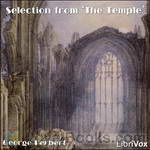 Selection from 'The Temple'
Selection from 'The Temple'
George Herbert (April 3, 1593 – March 1, 1633) was a Welsh poet, orator and a priest. Throughout his life he wrote religious poems characterized by a precision of language, a metrical versatility, and an ingenious use of imagery or conceits that was favored by the metaphysical school of poets. He is best remembered as a writer of poems and hymns such as “Come, My Way, My Truth, My Life” and “The King of Love My Shepherd Is.” | |
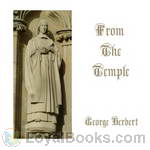 From The Temple
From The Temple
George Herbert was a country minister, and a protégé of the great metaphysical poet John Donne. In The Temple, Herbert combines these two aspects of his training in one of the greatest cycles of religious poetry ever written. This is reading of a selection of these poems. | |
 Country Parson: His Character and Rule of Life
Country Parson: His Character and Rule of Life
George Herbert was an English poet, orator, and priest. In The Country Parson he describes the roles of the priest and offers practice advice to English clergymen about how to fulfill their duties. - Summary by Karen Clausen-Brown | |
By: George Herbert Betts (1868-1934) | |
|---|---|
 How to Teach Religion Principles and Methods
How to Teach Religion Principles and Methods
| |
By: George Hodges (1856-1919) | |
|---|---|
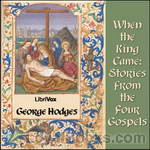 When the King Came: Stories from the Four Gospels
When the King Came: Stories from the Four Gospels
THIS tells how once the King of Glory came from heaven to visit us here on earth and live amongst us; how He was born in Bethlehem and brought up in Nazareth; how He went about telling people of the Heavenly Kingdom, and doing good, ministering to the sick and the poor; how He was misunderstood, and disliked, and even hated, till at last they took Him in Jerusalem and nailed Him to a cross so that He died; and how, after that, He came to life again, and went back into heaven, promising to return. | |
By: George John Romanes (1848-1894) | |
|---|---|
 A Candid Examination of Theism
A Candid Examination of Theism
| |
 Thoughts on Religion
Thoughts on Religion
| |
By: George Ludington Weed (1828-1904) | |
|---|---|
 A Life of St. John for the Young
A Life of St. John for the Young
| |
By: George MacDonald (1824-1905) | |
|---|---|
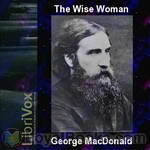 The Wise Woman
The Wise Woman
George MacDonald was an influential Scottish author, poet, and Christian minister. MacDonald’s works (particularly his fairy tales and fantasy novels) claimed the admiration of such authors as J. R. R. Tolkien, C. S. Lewis, and Madeleine L’Engle. The Wise Woman fairy tale was one of MacDonald’s more popular works. This delightful story describes how a woman of mysterious powers pays visits to two very different young girls: one a princess, the other a shepherd’s daughter. Neither girl is left unchanged by the startling events that are unleashed as a result: and the reader is confronted by astonishing fairy-worlds in which the girls are forced to choose between good and evil... | |
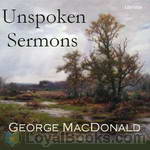 Unspoken Sermons
Unspoken Sermons
George MacDonald was a Scottish author, poet, and Christian minister. In his day he was considered one of the great Victorian authors on par with Dickens, Thackeray, Kipling and the like. His reputation as an author, however, has not fared as well largely because of the ubiquitous and fervent presence of religion throughout his works.MacDonald's theology, though sprinkled liberally throughout his fairly substantial number of books, is perhaps nowhere more palpable than in Unspoken Sermons. These sermons, though by no means amongst the most popular of MacDonald's work, have had theological impact from their first appearance... | |
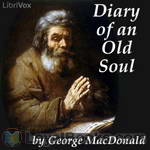 Diary of an Old Soul
Diary of an Old Soul
George MacDonald, a Scottish pastor, wrote these short poems, one for each day of the year, to help him with the severer misfortune he was experiencing. The poems are filled with hope and promises of Christ, yet, he also writes about his doubts. These poems are wonderful to listen to for people of any religion. | |
 Alec Forbes of Howglen
Alec Forbes of Howglen
| |
 Miracles of Our Lord
Miracles of Our Lord
Actions, it is often said, speak louder than words. But in the life of Christ - as George MacDonald shows - both spoke with an equal volume. Much attention is often devoted to what Jesus said while He was on earth, but many in our modern age are puzzled by the miracles. What are we to make of them? MacDonald - wise and gentle as ever - invites us into the miracles as a doorway into the inner life of Christ that we may intimately know Him and His Father. | |
 England's Antiphon
England's Antiphon
"In this book I have sought to trace the course of our religious poetry from an early period of our literary history. ... [I]f its poetry be the cream of a people's thought, some true indications of the history of its religious feeling must be found in its religious verse, and I hope I have not altogether failed in setting forth these indications. My chief aim, however, will show itself to have been the mediating towards an intelligent and cordial sympathy betwixt my readers and the writers from whom I have quoted. In this I have some confidence of success. Heartily do I throw this my small pebble at the head of the great Sabbath-breaker Schism." - From the Preface | |
By: George Manville Fenn (1831-1909) | |
|---|---|
 Quicksilver The Boy With No Skid To His Wheel
Quicksilver The Boy With No Skid To His Wheel
| |
 Mass' George A Boy's Adventures in the Old Savannah
Mass' George A Boy's Adventures in the Old Savannah
| |
By: George Müller (1805-1898) | |
|---|---|
 Answers to Prayer, from George Müller's Narratives
Answers to Prayer, from George Müller's Narratives
Mr. Brooks, in this compilation, has endeavored to select those incidents and practical remarks from Mr. Müller's Narratives, that show in an unmistakeable way, both to believers and unbelievers, the secret of believing prayer, the manifest hand of a living God, and His unfailing response, in His own time and way, to every petition which is according to His will. (From the Preface) | |
By: George Sale (1697-1736) | |
|---|---|
 The Koran (Al-Qur'an)
The Koran (Al-Qur'an)
| |
By: George Smith (1833-1919) | |
|---|---|
 Life of William Carey
Life of William Carey
| |
By: George Spring Merriam (1843-1914) | |
|---|---|
 The Chief End of Man
The Chief End of Man
| |
By: George Thomas Daly (1872-1956) | |
|---|---|
 Catholic Problems in Western Canada
Catholic Problems in Western Canada
| |
By: George Tybout Purves (1852-1901) | |
|---|---|
 Joy in Service; Forgetting, and Pressing Onward; Until the Day Dawn
Joy in Service; Forgetting, and Pressing Onward; Until the Day Dawn
| |
By: George Tyrrell (1861-1909) | |
|---|---|
 The Faith of the Millions (2nd series)
The Faith of the Millions (2nd series)
| |
By: George W. Foote (1850-1915) | |
|---|---|
 Comic Bible Sketches Reprinted from "The Freethinker"
Comic Bible Sketches Reprinted from "The Freethinker"
| |
 Bible Romances First Series
Bible Romances First Series
| |
 Prisoner for Blasphemy
Prisoner for Blasphemy
| |
 Arrows of Freethought
Arrows of Freethought
| |
By: George William Cox (1827-1902) | |
|---|---|
 Crusades
Crusades
The Crusades were a series of religious wars fought between 1096 and 1272 to recover the Holy Land from Islamic rule. According to the Latin Church, Crusaders were penitent pilgrims whose sins were forgiven. British historian, George Cox, writes of the churchmen, great and small, who inspired the Crusades, of the warriors who left families and lands behind, of the wily Venetian merchants and Byzantine emperors who exploited the knights, and of the valor of the Saracens. Here are accounts of sublime sacrifice and bestial ferocity, of dynastic conflict within the Crusader States, of sieges, starvation, pestilence, and ambush, and of the clash and interpenetration of two cultures... | |
By: Georgeanna M. Gardenier | |
|---|---|
 Two Decades A History of the First Twenty Years' Work of the Woman's Christian Temperance Union of the State of New York
Two Decades A History of the First Twenty Years' Work of the Woman's Christian Temperance Union of the State of New York
| |
By: Gerard F. Scriven (?-1949) | |
|---|---|
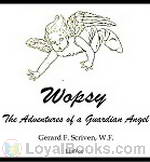 Wopsy: The Adventures of a Guardian Angel
Wopsy: The Adventures of a Guardian Angel
Wopsy is the story of a very young Guardian Angel, sent to watch over a pagan baby in Africa. Wopsy desperately wants his baby's soul to become white and clean in baptism, but what is a small guardian angel to do when there is no missionary priest in the village?The author was a member of the missionary order of priests known as the White Fathers (So named because of the white habits they wore). He wrote the "Wopsy" series of books in order to encourage missionary vocations in young children. | |
By: Gertrude P. Dyer | |
|---|---|
 Parables from Flowers
Parables from Flowers
| |
 Little Pollie Or a Bunch of Violets
Little Pollie Or a Bunch of Violets
| |
By: Gilbert Murray (1866-1957) | |
|---|---|
 Five Stages of Greek Religion
Five Stages of Greek Religion
| |
By: Glance Gaylord (1847-1868) | |
|---|---|
 Culm Rock The Story of a Year: What it Brought and What it Taught
Culm Rock The Story of a Year: What it Brought and What it Taught
| |
By: Goldsworthy Lowes Dickinson (1862-1932) | |
|---|---|
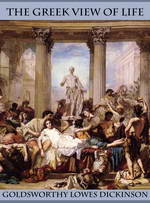 The Greek View of Life
The Greek View of Life
“With the Greek civilisation beauty perished from the world. Never again has it been possible for man to believe that harmony is in fact the truth of all existence.”This elegantly-written work provides a splendid introduction to the Greeks of the classic period: how they thought, wrote, and organised their lives and loves. Although it dates from the 1890s, there is very little about it that has dated. To its author’s credit, the subject of “Greek love” is dealt with in a sane and factual context - despite the judicial assassination of Oscar Wilde going on in the background... | |
By: Goldwin Smith (1823-1910) | |
|---|---|
 No Refuge but in Truth
No Refuge but in Truth
| |
 The Religious Situation
The Religious Situation
| |
By: Gottfried Wilhelm Leibniz (1646-1716) | |
|---|---|
 Theodicy Essays on the Goodness of God, the Freedom of Man and the Origin of Evil
Theodicy Essays on the Goodness of God, the Freedom of Man and the Origin of Evil
| |
By: Grace Beaumont | |
|---|---|
 Aunt Judith The Story of a Loving Life
Aunt Judith The Story of a Loving Life
| |
By: Grace Livingston Hill (1865-1947) | |
|---|---|
 The Best Man
The Best Man
Cyril Gordon, a young and handsome secret service agent is running from pursuers who desperately want the information he holds. He hides out from them in a church, and then finds himself married to a woman he’s never seen before. A sweet and sometimes, funny, romance, with several exciting chases. | |
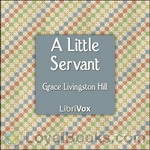 A Little Servant
A Little Servant
A short story of a little girl who is Jesus’ servant and how she won the heart of an unbelieving gardener. | |
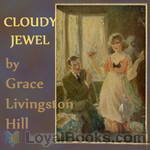 Cloudy Jewel
Cloudy Jewel
Julia Cloud, the oldest--and most responsible--child of her family, helped raise her four siblings due to their mother's long-time illness and father's death. After faithfully nursing two ill brothers (who died), she then cared for her invalid mother for many years. When Julia's mother passes on, her only surviving sibling Ellen fully expects--and nearly demands--that her spinster sister come live with her family. But to earn her keep, Julia must be their live-in housekeeper and babysitter for Ellen's four children. But Julia's college-age niece and nephew arrive unexpectedly from California and offer Aunt Cloudy Jewel a surprise opportunity she never expected in her wildest dreams. | |
 Pansies for Thoughts
Pansies for Thoughts
The young Grace Livingston compiled this book using quotes from her aunt's works; Isabella Macdonald Alden . It is a quote for each day of the year from one of the "Pansy Books" plus a bit of related scripture or verse. - Summary by LikeManyWaters | |
 Chautauqua Idyl
Chautauqua Idyl
The trees, flowers, and animals of a peaceful pasture meet together to discuss and learn of theology. Summary by Scarlett Martin. | |
By: Grafton Elliot Smith (1871-1937) | |
|---|---|
 The Evolution of the Dragon
The Evolution of the Dragon
| |
By: Gregory of Nazianzus (329-389/390) | |
|---|---|
 Theological Orations
Theological Orations
After the death of the Arian Emperor Valens, the synod of Antioch in 379 asked Gregory to help resurrect Constantinople to Nicene orthodoxy. While the most important churches were still headed by Arian bishops, Gregory transformed his cousin's villa into the Anastasia chapel. From this little chapel he delivered five powerful discourses on Nicene doctrine, explaining the nature of the Trinity and the unity of the Godhead. These are called the "Theological Orations." By the time he left Constantinople two years later, there did not remain one Arian church in all of the city. | |
 Funeral Orations
Funeral Orations
Gregory the Theologian, also known as Gregory Nazianzen was a 4th-century Archbishop of Constantinople. He is widely considered the most accomplished rhetorical stylist of the patristic age. Along with the brothers Basil the Great and Gregory of Nyssa, he is known as one of the Cappadocian Fathers. Gregory is a saint in both Eastern and Western Christianity. In the Roman Catholic Church he is numbered among the Doctors of the Church; in Eastern Orthodoxy and the Eastern Catholic Churches he is revered as one of the Three Holy Hierarchs, along with Basil the Great and John Chrysostom... | |
By: Gregory of Nyssa | |
|---|---|
 On Virginity
On Virginity
His admirable book "On Virginity", written about 370, was composed to strengthen in all who read it the desire for a life of perfect virtue. - Summary by Herbermann, Charles, ed. . | |
By: Gustave Flaubert (1821-1880) | |
|---|---|
 The Temptation of St. Antony or A Revelation of the Soul
The Temptation of St. Antony or A Revelation of the Soul
| |
By: H. C. G. (Handley Carr Glyn) Moule (1841-1920) | |
|---|---|
 Messages from the Epistle to the Hebrews
Messages from the Epistle to the Hebrews
| |
 Philippian Studies Lessons in Faith and Love from St. Paul's Epistle to the Philippians
Philippian Studies Lessons in Faith and Love from St. Paul's Epistle to the Philippians
| |
By: H. G. Wells (1866-1946) | |
|---|---|
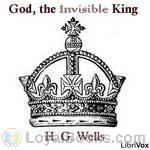 God, the Invisible King
God, the Invisible King
Wells wrote in his book God the Invisible King that his idea of God did not draw upon the traditional religions of the world: "This book sets out as forcibly and exactly as possible the religious belief of the writer. [Which] is a profound belief in a personal and intimate God." Later in the work he aligns himself with a "renascent or modern religion ... neither atheist nor Buddhist nor Mohammedan nor Christian ... [that] he has found growing up in himself." | |
 Soul of a Bishop
Soul of a Bishop
| |
By: H. J. (Harry John) Wilmot-Buxton (1843-1911) | |
|---|---|
 The Life of Duty, v. 2 A year's plain sermons on the Gospels or Epistles
The Life of Duty, v. 2 A year's plain sermons on the Gospels or Epistles
| |
By: H. Rider Haggard | |
|---|---|
 The Wizard
The Wizard
Described by the author, best known for his King Solomon's Mines, as "a tale of victorious faith," this story begins on a Sunday afternoon in an English church. Most of the book, though, is set in Africa, and the adventure story is as engaging as any of Haggard's African tales. What makes this one different is the religious question: What has happened to miracles in the church? Is there any power left in Jesus' promise, "Whoso that believeth in me, the works that I do he shall do also, and whatsoever ye shall ask in my name, that will I do"? | |
 The Brethren
The Brethren
Set in the days of the Crusaders, this books tells of a young maiden named Rosamund, and her twin cousins. Godwin is the grey eyed thoughtful man, and Wulf is the blue eyed warrior. They are both knights of England and they are both in love with their fair cousin. But the riddle of the story is which does Rosamund love?The adventure begins when Rosamund is taken from England and carried to the East. The plot thickens as the two young knights follow her in hopes of rescuing her from the Muslim leader, Saladin... | |
By: H. S. Olcott (1832-1907) | |
|---|---|
 Buddhist Catechism
Buddhist Catechism
The simple aim of this little book is to give so succinct and yet comprehensive a digest of Buddhistic history, ethics and philosophy as to enable beginners to understand and appreciate the noble ideal taught by the Buddha, and thus make it easier for them to follow out the Dharma in its details. In this book, information is presented in a catechism format: question and answer. The matter has been grouped within five categories, viz.: (1) The Life of the Buddha; (2) the Doctrine; (3) the Sangha, or monastic order; (4) a brief history of Buddhism, its Councils and propaganda; (5) some reconciliation of Buddhism with science... | |
By: H. Stanley (Herbert Stanley) Redgrove (1887-1943) | |
|---|---|
 Bygone Beliefs: being a series of excursions in the byways of thought
Bygone Beliefs: being a series of excursions in the byways of thought
| |
By: H. Trusta (1815-1852) | |
|---|---|
 The Angel over the Right Shoulder The Beginning of a New Year
The Angel over the Right Shoulder The Beginning of a New Year
| |
By: Hamilton Wright Mabie (1846-1916) | |
|---|---|
 Fruits of the Spirit
Fruits of the Spirit
A collection of essays written by the renowned lecturer and author during the First World War, when he was quite depressed. The general themes of the collection are persevering in faith, guidance by the Holy Spirit and standing for the "Test of Courage". - Summary by Beth Thomas | |
By: Handley Carr Glyn Moule (1841-1920) | |
|---|---|
 Epistle of St Paul to the Romans
Epistle of St Paul to the Romans
He who attempts to expound the Epistle to the Romans, when his sacred task is over, is little disposed to speak about his Commentary; he is occupied rather with an ever deeper reverence and wonder over the Text which he has been permitted to handle, a Text so full of a marvellous man, above all so full of God. It remains only to express the hope that these pages may serve in some degree to convey to their readers a new Tolle, Lege for the divine Text itself; if only by suggesting to them sometimes the words of St Augustine, "To Paul I appeal from all interpreters of his writings." | |
 Christus Consolator: Words for Hearts in Trouble
Christus Consolator: Words for Hearts in Trouble
This book is intended principally to remind those whose hearts the European War has stricken of the hope and comfort which lie ready for their wounds in our Lord Jesus Christ. I shall be glad indeed if anything in my pages may bring help to other sorrowing souls; for grief and death do not suspend their normal visitation among us, the infliction of the sore pains and losses of common life, because of their tremendous activities today on the field of battle, in the war-hospital, and on the deep. But I have written with these latter troubles more directly in view... | |
By: Hannah Trager (1870-1943) | |
|---|---|
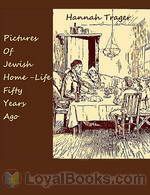 Pictures of Jewish Home-Life Fifty Years Ago
Pictures of Jewish Home-Life Fifty Years Ago
Hannah Trager published Pictures of Jewish Home-Life Fifty Years Ago in 1926, so the book is a portrait of day to day life for a Jewish family in Jerusalem around 1876. In each chapter, Mr. Jacobs reads a letter from his cousins living in Jerusalem many years earlier, each one teaching his family and friends about a different holiday or tradition of their people. (Introduction by wildemoose) | |